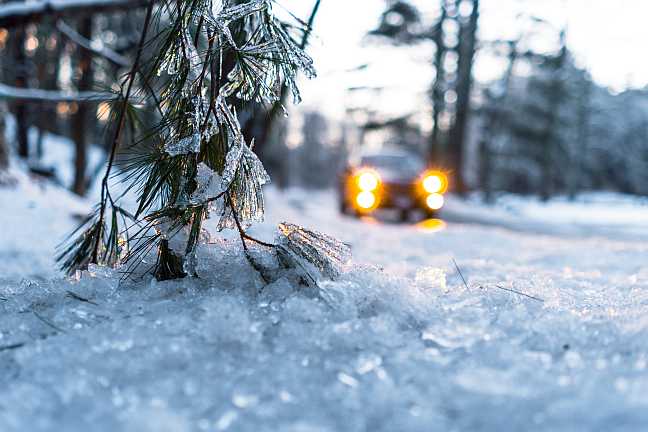Does RV antifreeze freeze? To avoid doing so, use the best type of RV antifreeze which is made from Propylene Glycol.
This article discusses issues with how this liquid solution handles colder weather and makes specific reference to Propylene Glycol because it’s the right type to use.
However, as a general reference, the information in this article is universally applicable.
Does RV antifreeze freeze? RV antifreeze does not usually freeze up to the “burst point,” which is the stage when a water pipe may burst. The burst point is lower than the water’s freezing point through the use of RV antifreeze. At best, it will take on the consistency of gel rather than freeze solid.
In this article, we go deeper into whether RV antifreeze is capable of freezing inside your RV’s plumbing systems.
RV Antifreeze
Our articles on RV antifreeze selection, suggested use, and safe disposal:
> Will RV Antifreeze Kill Grass?
> Will RV Antifreeze Thaw Frozen Pipes?
> Is RV Antifreeze Toxic to Animals?
Does RV Antifreeze Freeze?
95 percent of the answer is: No, it doesn’t freeze.
The other 5 percent for RV antifreeze freezing is when it gets close to its burst point or the maximum limit for the cold temperature it can withstand.
At that stage, it will change from liquid form to the consistency of a gel. It will then be “gloopy” and not be free-flowing any longer.
How Will RV Antifreeze Expand Compared to Water?
One of the benefits of antifreeze made from Propylene Glycol is that it doesn’t significantly expand in size as the temperature drops well below the normal freezing point.
ⓘ If you click this link and make a purchase, we earn a commission at no additional cost to you.
This differs from water which will occupy a greater amount of space in a frozen state than in its normal H2O liquid state.
Why does this matter?
Because when the water pipes have a minimal amount of water remaining but a good amount of RV antifreeze solution, the expansion at colder temperatures is far less likely to burst a pipe.
Freezing Temperature Changes

It’s important to appreciate that when there’s a higher level of water still in the RV’s plumbing system, this raised the freezing temperature even when antifreeze has been added.
Essentially, you then get a blend of water and antifreeze which reduces the effectiveness of the Propylene Glycol to produce inadequate protection for your water pipes.
Read Also: Is RV Antifreeze Toxic to Animals?
Will RV Antifreeze Freeze in the Freshwater Tank?
There’s a general reluctance by many RV and camper owners to use antifreeze in the freshwater tank. This is because they’re worried that it will taint the future water supply.
To address this point, in terms of leaving the taste of antifreeze in the water supply, that’s unlikely when the antifreeze is removed, it’s flushed multiple times with water.
This should be performed until the water has no aftertaste at all. It’s a good idea to be at an RV park with full hookups to perform this function adequately.
In terms of the freezing of the freshwater tank itself, it’s worth noting that the conversion from a liquid to a gel-like substance doesn’t require much additional space (if any).
So, even with partial freezing of RV antifreeze, it represents only a minimal risk to the freshwater tank or other RV plumbing systems.
Does RV Antifreeze Get Slushy or Gel-like? Can It Still Be Used in this State?
While it’s preferable to use RV antifreeze in its original liquid form, it’s still acceptable to use it when it’s already transformed into a slushy or gel-like state.
The main distinction here is whether it’s just gel-like or slushy or has frozen solid. If it’s frozen, then it should not be intentionally thawed and used. The frozen state indicates that it’s gone bad.
ⓘ If you click this link and make a purchase, we earn a commission at no additional cost to you.
What is the Freezing Point of RV Antifreeze?
The freezing point for RV antifreeze is the stage when ice crystals form from the antifreeze solution.
This will be at a lower temperature than the freezing point of water, but when mixed with any remaining water in a water pipe or tank, this will raise the freezing point.
This is why an RV’s plumbing system during the winterizing process must first be completely expunged of all water to protect it.
Understanding Burst Points
The burst point is less understood. This was originally devised by plumbers in the 1930s to confirm at what stage a copper pipe would burst.
Since this time, it’s become another measurement of the performance of RV antifreeze when shopping for it.
Read Also: Will RV Antifreeze Thaw Frozen Pipes?
Choosing the Right RV Antifreeze
Which antifreeze should be selected?
It depends on how cold it gets in your home region or the states you’ll be traveling through during the colder months.
Do consider the freeze and burst points for different solutions. Usually, they either protect down to -50F or -100F.
While the -100F version is costlier, it does no good to purchase the less effective one and then get caught out when the winter season is colder than expected.
We’ve lately been having some erratic weather patterns with extremes of temperature on either end of the spectrum.
So, RV owners should choose carefully when selecting the appropriate RV antifreeze for their particular needs.
